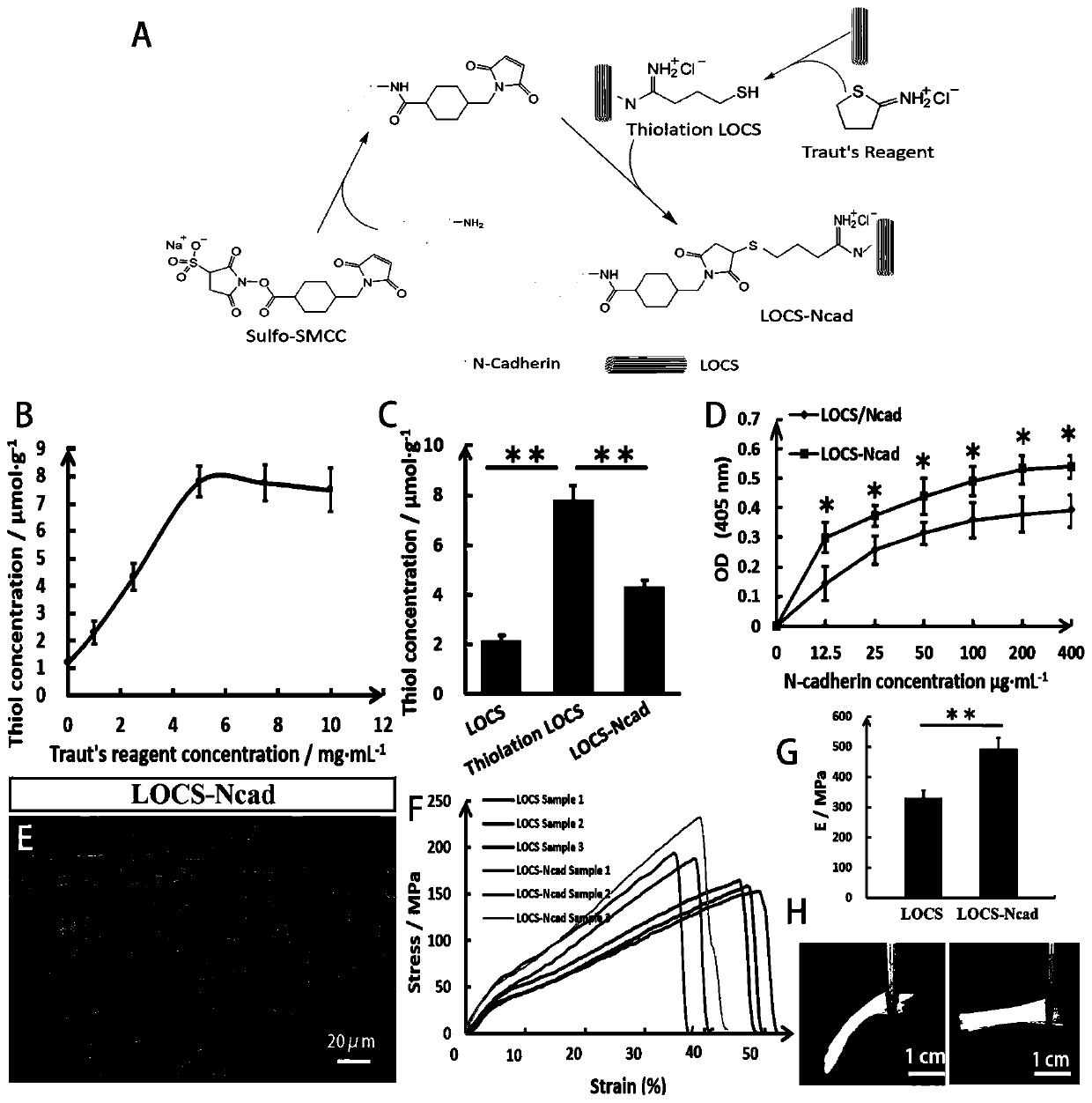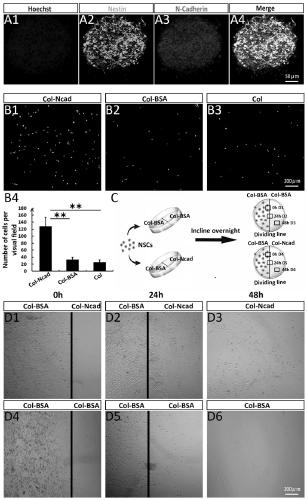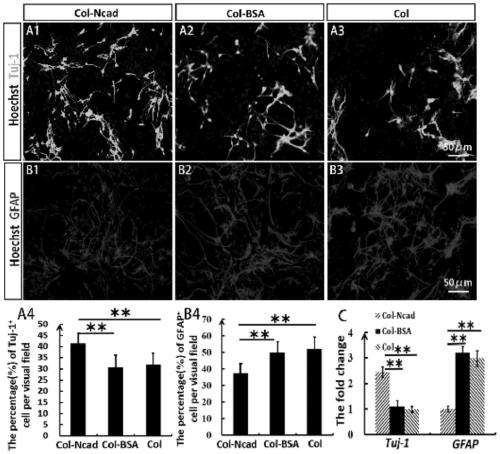Tissue engineering material for nerve injury repair as well as preparation method and application of tissue engineering material
A technology for tissue engineering and nerve injury, applied in the field of biodegradable materials of cross-linked nerve cadherin, which can solve the problems of limited application and poor mechanical strength, and achieve the effects of linear state stability, promotion of differentiation, and promotion of recovery
- Summary
- Abstract
- Description
- Claims
- Application Information
AI Technical Summary
Problems solved by technology
Method used
Image
Examples
Embodiment 1
[0049] Example 1 Preparation of a Linear Ordered Collagen Scaffold of Crosslinked N-cadherin (1)
[0050] The present invention provides a kind of LOCS (LOCS-Ncad) of cross-linking N-cadherin, which uses cross-linking agents Traut's and Sulfo-SMCC to cross-link N-cadherin to LOCS.
[0051] The preparation method of the LOCS of the above-mentioned cross-linked N-cadherin is as follows (the schematic diagram of the reaction principle of cross-linked N-cadherin on a linear ordered collagen scaffold is as follows: figure 1 shown in A):
[0052] (1) Use 300 μL of Traut's reagent (PBS, pH=8, 3mM EDTA) with a concentration of 5mg / mL to soak a bunch of LOCS at room temperature (the size of a bunch of LOCS is: length 4cm, diameter 4mm, and the size of each LOCS is For: length 4cm, diameter 0.25mm), immersion time is 2h; After immersion, soak and wash with PBS 3 times, each 5 minutes, obtain the LOCS modified by Traut's reagent;
[0053] (2) Use 200 μL of PBS solution (PBS, pH=7.2, 3m...
Embodiment 2
[0054] Example 2 Preparation of a Linear Ordered Collagen Scaffold of Crosslinked N-cadherin (2)
[0055] (1) Use 300 μL of Traut's reagent (PBS, pH=8, 3mM EDTA) with a concentration of 5mg / mL to soak a bunch of LOCS at room temperature (the size of a bunch of LOCS is: length 4cm, diameter 4mm, and the size of each LOCS is For: length 4cm, diameter 0.25mm), immersion time is 2h; After immersion, soak and wash with PBS 3 times, each 5 minutes, obtain the LOCS modified by Traut's reagent;
[0056] (2) Use 200 μL of PBS solution (PBS, pH=7.2, 3mM EDTA) of N-cadherin recombinant protein and Sulfo-SMCC (wherein, the final concentration of N-cadherin recombinant protein is 400 μg / mL, and the final concentration of Sulfo-SMCC is 3.2 mg / mL) at room temperature to soak the LOCS modified by Traut's reagent obtained in step (1) for 2 hours to obtain cross-linked N-cadherin LOCS.
experiment example 1
[0059] Experimental example 1 The effect of the amount of Traut's reagent and N-cadherin recombinant protein on cross-linking efficiency
[0060] According to the principle of cross-linking N-cadherin to LOCS with the cross-linking agent Traut’s reagent and Sulfo-SMCC, the cross-linking of N-cadherin was analyzed by detecting the concentration of sulfhydryl groups, as follows:
[0061] During the preparation of the linear ordered collagen scaffolds crosslinked with N-cadherin, 300 μL of Traut’s reagent (PBS, pH=8, 3 mM EDTA) with concentrations of 0, 1, 2.5, 5, 7.5, and 10 mg / mL were soaked at room temperature A bundle of LOCS (dimensions: length 4cm, diameter 4mm) was soaked for 2 hours to obtain LOCS diluted with Traut's reagent. Detect the concentration of sulfhydryl groups after treatment with different concentrations of Traut's reagent, the results are as follows figure 1 As shown in B, the results show that the sulfhydryl concentration of LOCS (Example 1 and Example 2) ...
PUM
| Property | Measurement | Unit |
|---|---|---|
| length | aaaaa | aaaaa |
| length | aaaaa | aaaaa |
| length | aaaaa | aaaaa |
Abstract
Description
Claims
Application Information
 Login to View More
Login to View More - R&D
- Intellectual Property
- Life Sciences
- Materials
- Tech Scout
- Unparalleled Data Quality
- Higher Quality Content
- 60% Fewer Hallucinations
Browse by: Latest US Patents, China's latest patents, Technical Efficacy Thesaurus, Application Domain, Technology Topic, Popular Technical Reports.
© 2025 PatSnap. All rights reserved.Legal|Privacy policy|Modern Slavery Act Transparency Statement|Sitemap|About US| Contact US: help@patsnap.com



